Domestic Violence Cases
Addison Steele has:
Defended hundreds of domestic violence cases. The first step is to try to convince the district attorney to not file the charges in the first place. On occasion that is successful and is referred to as a district attorney rejection. If charges are filed the next step is to try to convince the district attorney to file misdemeanor charges instead of felony charges. The next step is defending and negotiating the case.
Domestic violence cases, even with misdemeanor charges have extreme consequences. There's a Penal Code section, 1202.097, that mandates a series of mandatory terms and conditions of probation, these are referred to as "097 terms." They include a one-year domestic violence class, called the Batterer's Intervention Program, or BIP. The client has to pay for these classes themselves and they cost more than a thousand dollars. In Santa Barbara County there's a pilot program so the class is a six-month class. In other counties it's still a one-year program. Court dates to make sure that the client is in compliance with the classes. Twenty hours of community work service. If the case is a misdemeanor, supervised probation until the 097 terms are completed. A mandatory "donation" to an organization that supports domestic violence victims, and a minimum $500 fine.
The most common myth about domestic violence cases is: "My wife/husband/girlfriend/boyfriend/ is going to just call the police/district attorney and tell them that it didn't happen the way the police said and the case will be dismissed." In about ninety percent of domestic violence cases the alleged victim recants in some way or minimizes what was initially said to the police. The district attorneys that do these cases are geared up for this phenomenon and are completely unfazed by it. At trial they call an "expert" witness that will testify about the "wheel of violence" to explain why the alleged victim is recanting or minimizing. What also makes these cases challenging is that district attorney offices tend to assign their most talented trial attorneys to these cases. If you have been arrested for domestic violence or have been charged with domestic violence your NEED an experienced attorney that knows how to negotiate these cases and has had success at jury trials in these kinds of cases.
If your case cannot be resolved with a negotiated settlement you need a lawyer that has done and won domestic violence jury trials.
Addison has done four domestic violence trials where the client was acquitted of all charges (Either Penal Code §§ 245(a)(1), 273.5 or 243(e)(1)):
All the clients that are discussed here have given their permission to tell their stories on this webpage. Jury trials are public events and are not in any way confidential, however, despite the permission and public nature of jury trials, first names and case numbers are used.
(Daniel H., RIF130179, who was facing life in prison; Victor V., RIF131050, who was facing life in prison (he was convicted of a conceded DUI); Ronnell B., RIF113393, who was facing ten years in prison; and Gabriel V., 18CR03764).
Seven domestic violence acquittals (Penal Code §§ 245(a)(1) or 273.5)
(Daniel H., RIF130179, who was facing life in prison, Victor V., RIF131050, who was facing life in prison; Ronnell B., RIF113393, who was facing ten years in prison; Richard S., 1071841, acquitted of the felony count; David D., RIF108018, acquitted of the felony count; Gregory F., M984739, acquitted of a misdemeanor count; and Jeanette S., 18CR01797, acquitted of a misdemeanor count).
Six domestic battery acquittals (Penal Code § 243(e)(1))
(Daniel H., RIF130179, acquitted of the lesser included offense of domestic battery; Ronnell B., RIF113393, acquitted of the lesser included offense of d0mestic battery; Richard S., 1071841, acquitted of the lesser included offense of domestic battery; Gregory F., M984739, acquitted of the lesser included offense of domestic battery; Jeannette S., 18CR01797, acquitted of the lesser included offense of domestic battery; and Gabriel V., 18CR03764, acquitted of domestic battery as well as all other counts that were charged).
One domestic battery hung jury (Penal Code § 243(e)(1))
(David D., RIF108018).
One domestic battery case (Penal Code § 243(e)(1)) dismissed after the trial had begun, Rachel W., 19CR00491
One domestic violence case (Penal Code § 273.5(a) and 243(e)(1)) dismissed after pre-trial motions, Lydia Z., 18CR07142.
Domestic Violence Rejections.
Domestic violence cases are really a unique type of criminal case. After the O.J. Simpson trial, the law was changed to essentially throw the Constitution out the window in order to make it easier for district attorneys to get convictions in domestic violence cases. Most district attorney offices have deputy district attorneys who specialize in domestic violence cases. The cases tend to be a contest between what the complaining witness (the alleged victim) says happened and what actually happened, making a skilled examination of the complaining witness critical.
Because of all of those reasons, it is absolutely imperative that you have an attorney who is experienced in handling domestic violence cases and knows the domestic violence evidence statutes well. It, of course, helps to have an attorney who has experience beating domestic violence charges. If you need to hire a lawyer for a domestic violence case, you need a lawyer who has experience with domestic violence trials and who has won many domestic violence trials that have gone before a jury. If your lawyer is not known for going to trial on these cases, and winning trials in these kinds of cases, the negotiation to resolve the case will not be as effective.
Addison won five of the seven felony domestic violence trials he has done, and two of those trials were full acquittals where the client was facing life in prison because the domestic violence charges were third strikes. Addison's record of trial wins in domestic violence cases is unparalleled.
His domestic violence trial successes include:
Some recent domestic violence rejections.
Robin F.
Robin had been the victim of domestic violence, but this time her abuser was smarter and called the police to accuse her of domestic violence so they wouldn’t see that he was the aggressor. The district attorney elected to reject the case.
Jeffry W.
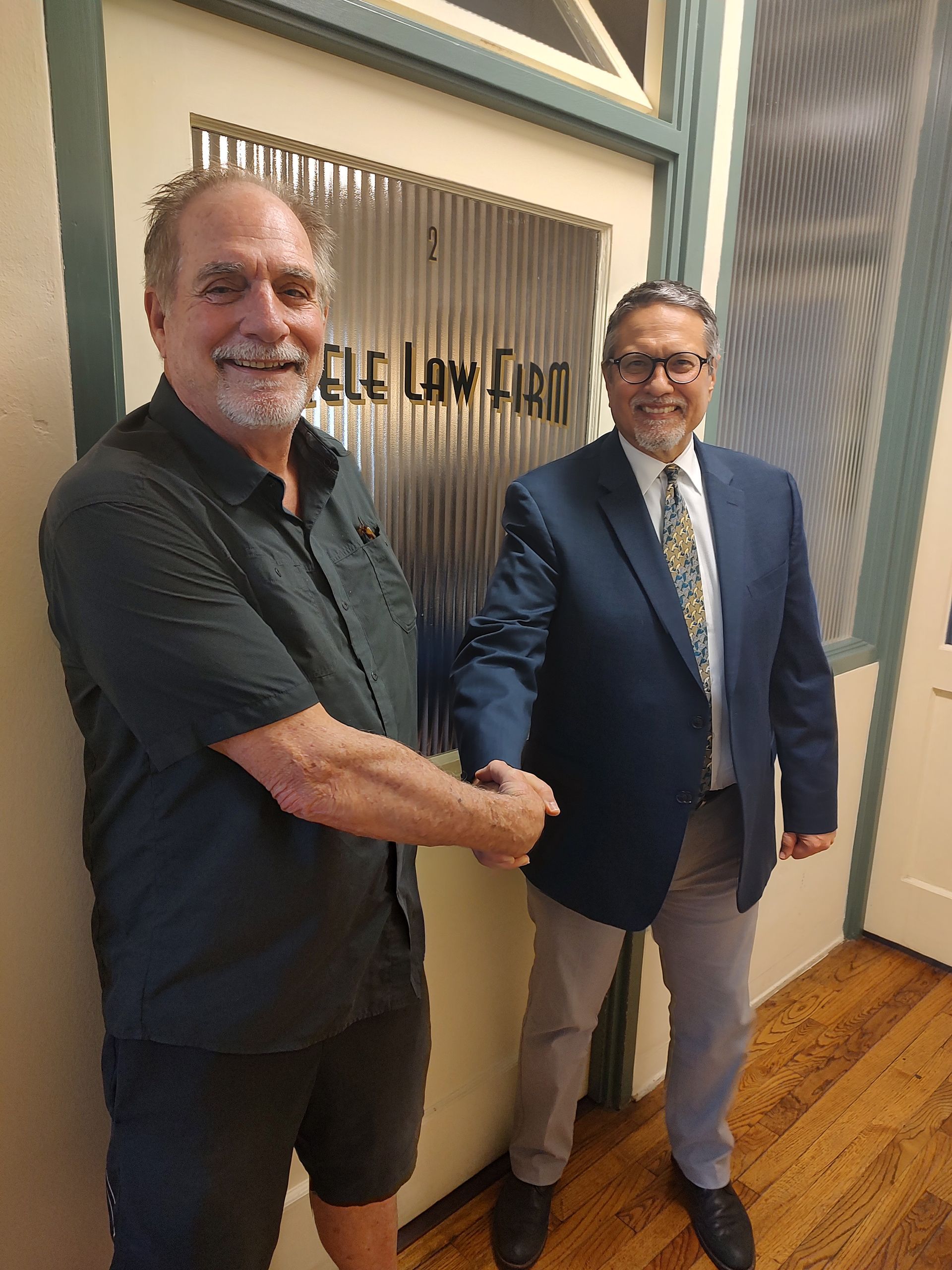
Jeff was the victim of false accusations. The district attorney rejected his case.
Addison and Jeff after Addison got confirmation that the case had been rejected.
Daniel H., RIF130179
- Charges: Domestic violence with a domestic violence prior (Penal Code § 273.5(e)), five prison term priors (Penal Code § 667.5(b)), and two strike priors (Penal Code § 667(c)&(e)(2)(A)/1170.12(c)(2)).
- Exposure: Danny was facing 30 years to life in prison.
- Outcome: Despite his ex-wife testifying that Danny had beaten her bloody, sending her to the hospital, the jury acquitted Danny on all charges. He was found not guilty of domestic violence and all the lesser included offenses. Danny was immediately released and has lived crime-free.
This case was challenging because the complaining witness (alleged victim) was so vociferously adamant that Danny had beaten her. The physical evidence didn't match her testimony. For example she was sitting in the driver's seat and Danny was in the passenger seat and it was the dashboard on the passenger side of the car that was covered in blood. Danny testified that it was the complaining witness that in fact beat him, which was the reason that he was injured and that she told him that she was going to tell the police that he beat her because she knew that he had two strike priors and that he would get a life sentence. The jury acquitted Danny of all charges and he went home.
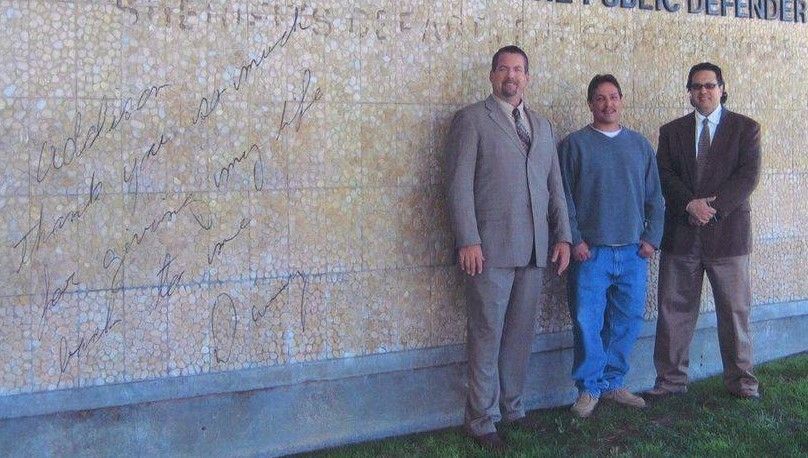
Danny, Addison, and the investigator on the case after the verdict
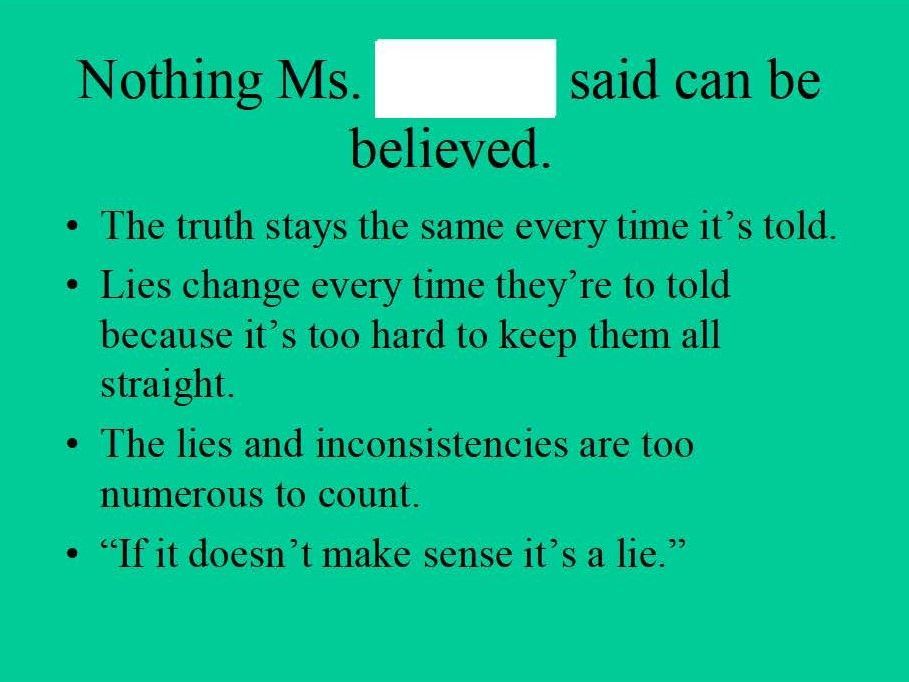
This is one of the slides that Addison used in his closing argument.
The jury agreed that the alleged victim lied and acquitted Danny on all charges and he went home.
Victor V., RIF131050
- Charges: Assault with a car (Penal Code § 245(a)(1), hit and run (Vehicle Code § 20001(a)), and later driving under the influence (Vehicle Code §§ 23152(a) &(b)).
- Exposure: Victor was facing 50 years to life in prison.
- Outcome: Despite Victor's girlfriend's testimony that Victor had tried to run her over with his pickup truck, the jury acquitted Victor of all charges, except a conceded unrelated driving under the influence charge. Victor was given credit for time served for the DUI and released from jail. He now runs his own lawn care business.
This case was challenging because Victor's girlfriend wanted so badly for him to be convicted and sentenced to life in prison. The jury saw through her anger, along with her story not matching the basic physics of how a car moves (the back of a car doesn't flare out when slowly driving nose first out of a parking space). Victor was acquitted of all charges, other than an unrelated conceded DUI, and went home.

The Verdict Form and Minute Order where Victor was saved from a life in prison sentence.
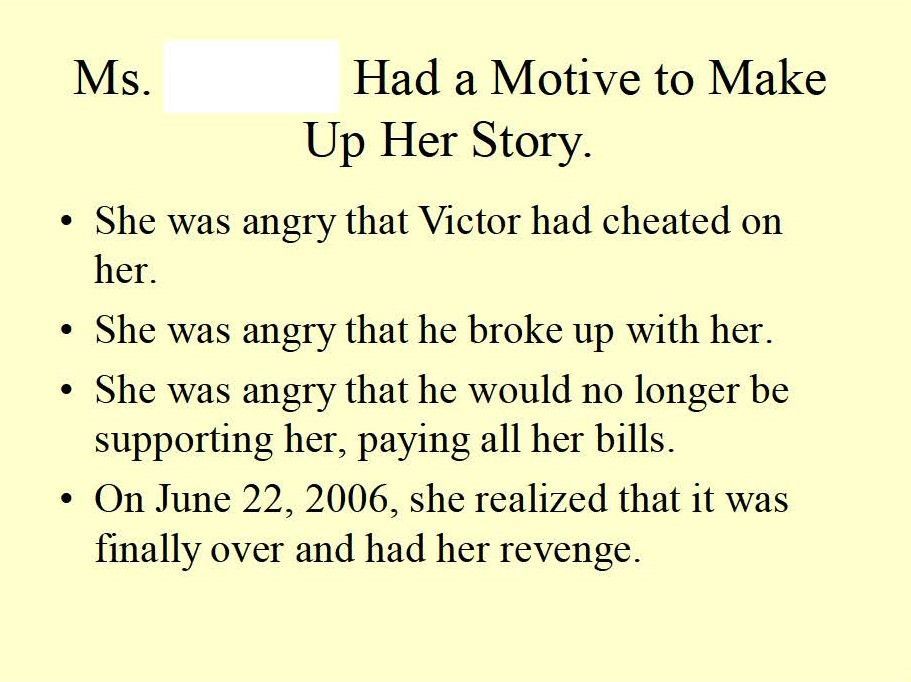
This is one of the slides that Addison used in his closing argument for Victor.
The jury agreed that the alleged victim lied in order to get her revenge for Victor ending their relationship.
He was acquitted of all charges except an unrelated conceded DUI and went home.
Ronnell B., RIF113393
- Charges: Domestic violence (Penal Code § 273.5(a)) with a prison term prior (Penal Code § 667.5(b)) and a strike prior (Penal Code § 667(c)&(e)(2)(A)/1170.12(c)(2)).
- Exposure: Ronnell was facing ten years in prison.
- Outcome: Despite his girlfriend testifying that he had hit and injured her, Ronnell was acquitted of all charges, which were domestic violence and all the lesser included offenses, and released from jail.

The verdict forms where Ronnell was found NOT GUILTY on all charges and saved from a possible ten-year prison sentence.
Ronnell had a strike prior, so if he had lost even one felony count, he had to be sent to prison with a doubled sentence.
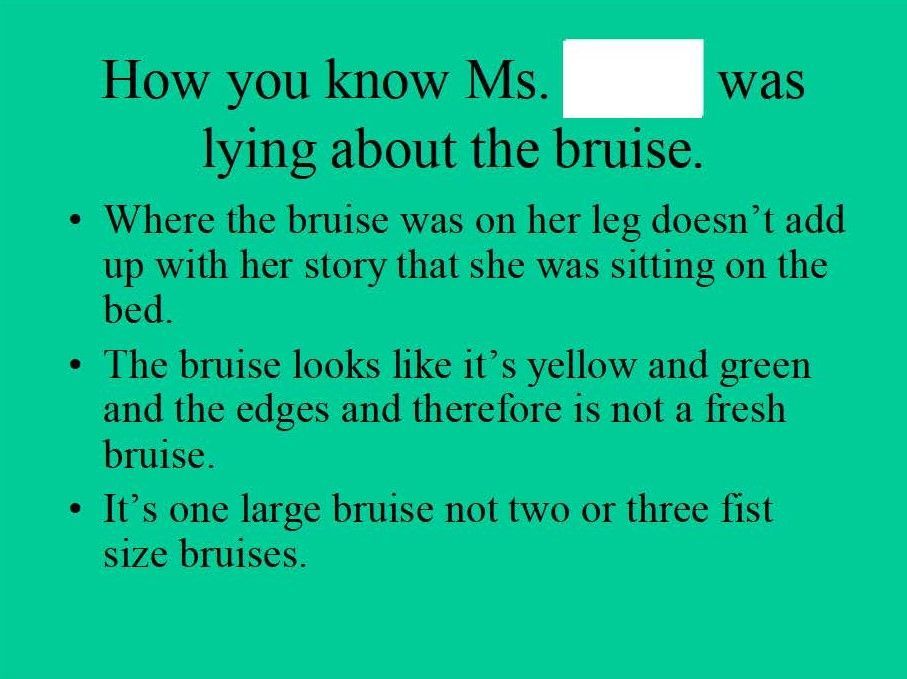
This is one of the slides that Addison used for Ronnell's closing argument.
The jury acquitted Ronnell of all charges and all lesser included offenses and he went home.
He had a prior strike so if he had been convicted of any felony count he would have gone to prison.
Gabriel V., 18CR03764
- Charges: Domestic battery (Penal Code § 243(e)(1)) with lesser included offenses of battery (Penal Code § 242) and assault (Penal Code § 240), trespassing (Penal Code § 602.5(b)) and child endangerment (Penal Code § 273a(b)).
- Exposure: Gabe was facing two years six months in jail.
- Outcome: Despite both the mother of his child and her mother testifying against him, the judge acquitted him of the child endangerment charge by granting Addison's Penal Code § 1118.1 motion in the middle of the trial and the jury acquitted him of all of the rest of the charges and all of the lesser included offenses.
This is Gabe and Addison after the verdicts.
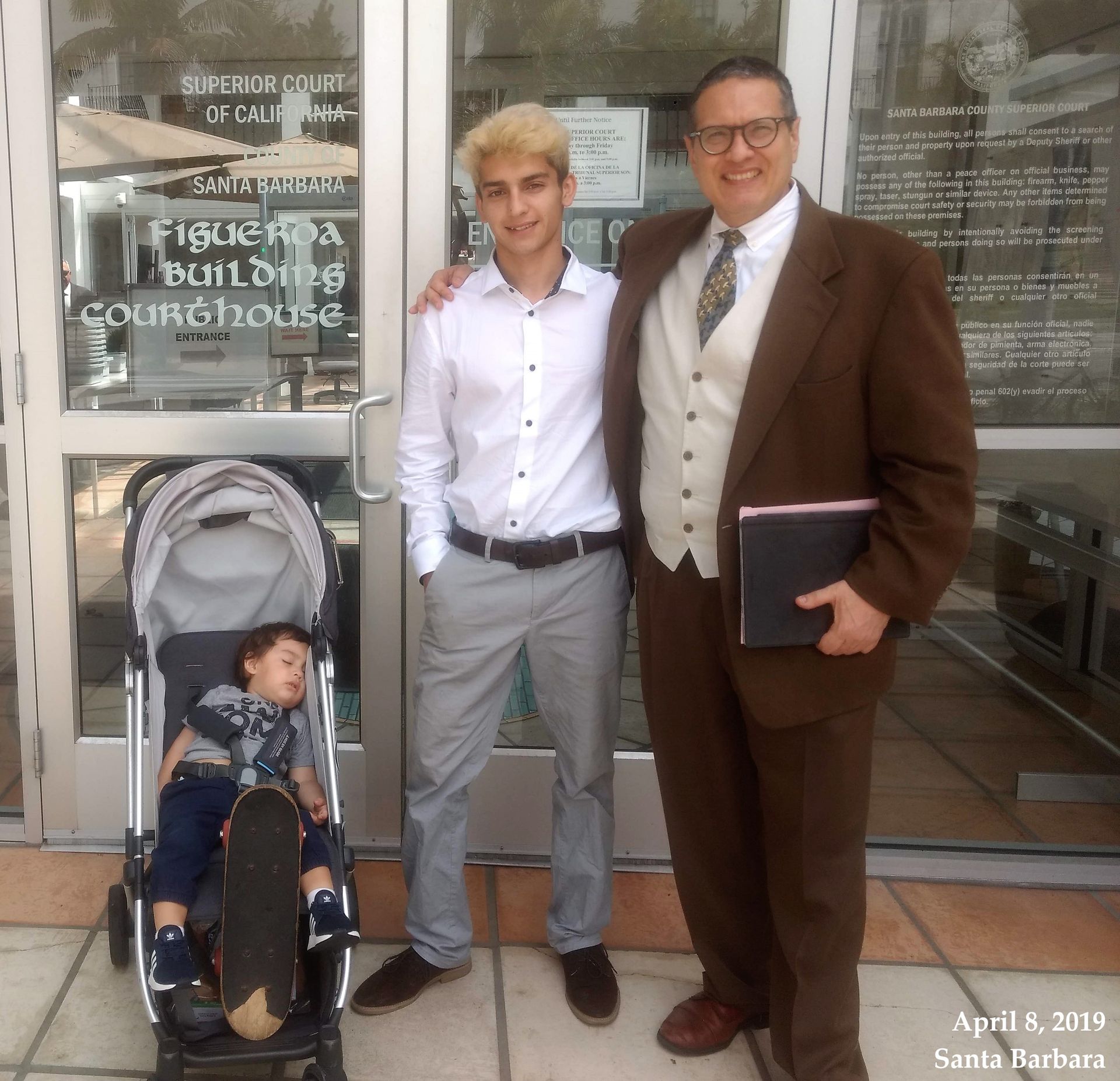
This is the verdict form from the most serious charge.
Gabe was acquitted of all charges.

Richard S., 1071841
- Charges: Assault on a police officer (Penal Code § 243(c)(2)), resisting arrest (Penal Code § 69), domestic violence (Penal Code § 273.5(a) and failure to appear in court (Penal Code § 1320.5).
- Exposure: Richard was facing five years and four months in prison.
- Outcome: Despite his girlfriend testifying that Richard had hit her, a highway patrolman testifying that Richard had hit him, and testimony that court records showed that he had not appeared in court, Richard was found not guilty of assault on a police officer and all the included offenses with that charge, not guilty of domestic violence and the lesser included offense, and not guilty of failure to appear in court. He was found guilty of resisting arrest, but the judge immediately reduced that charge to a misdemeanor.
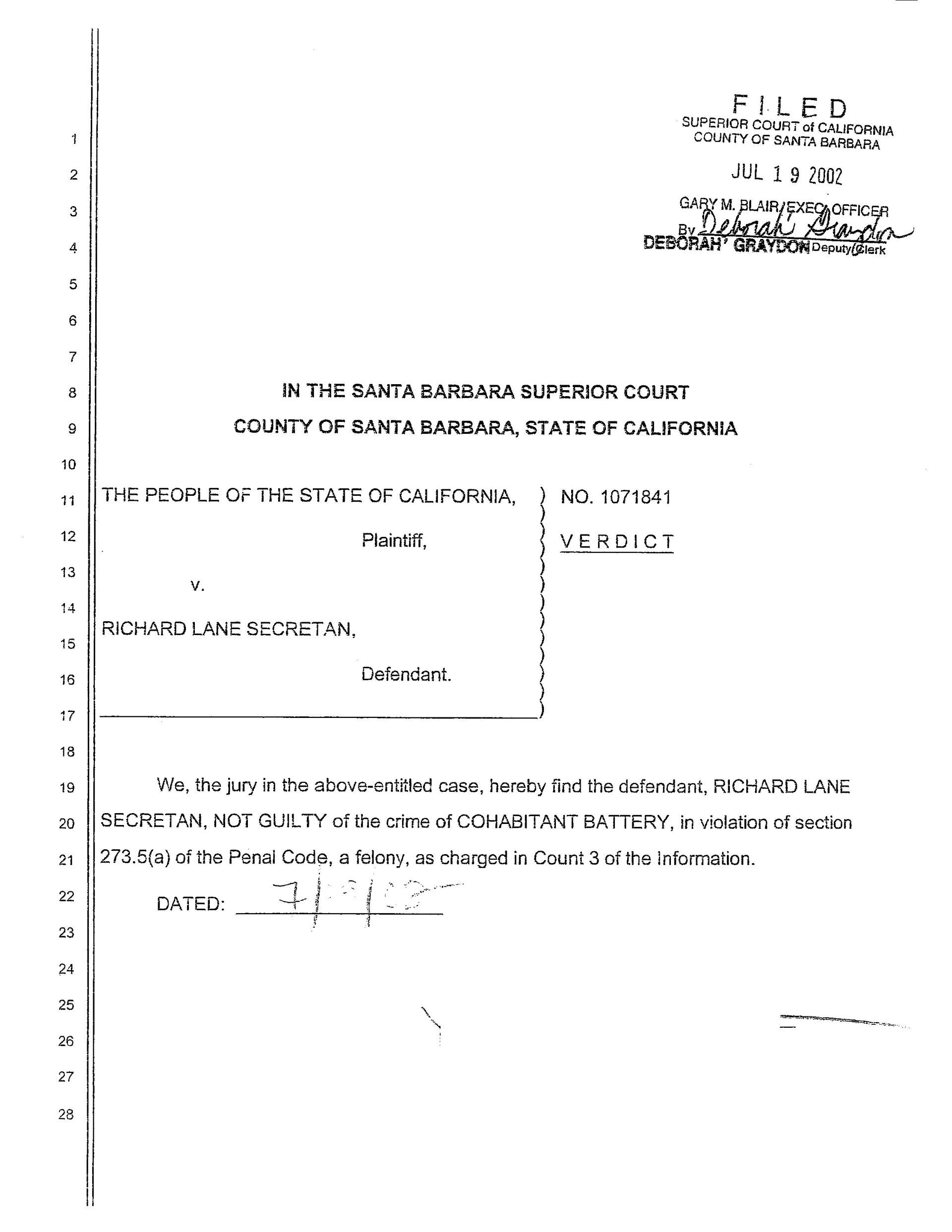
This is the Verdict Form where Richard was found NOT GUILTY of felony domestic violence.
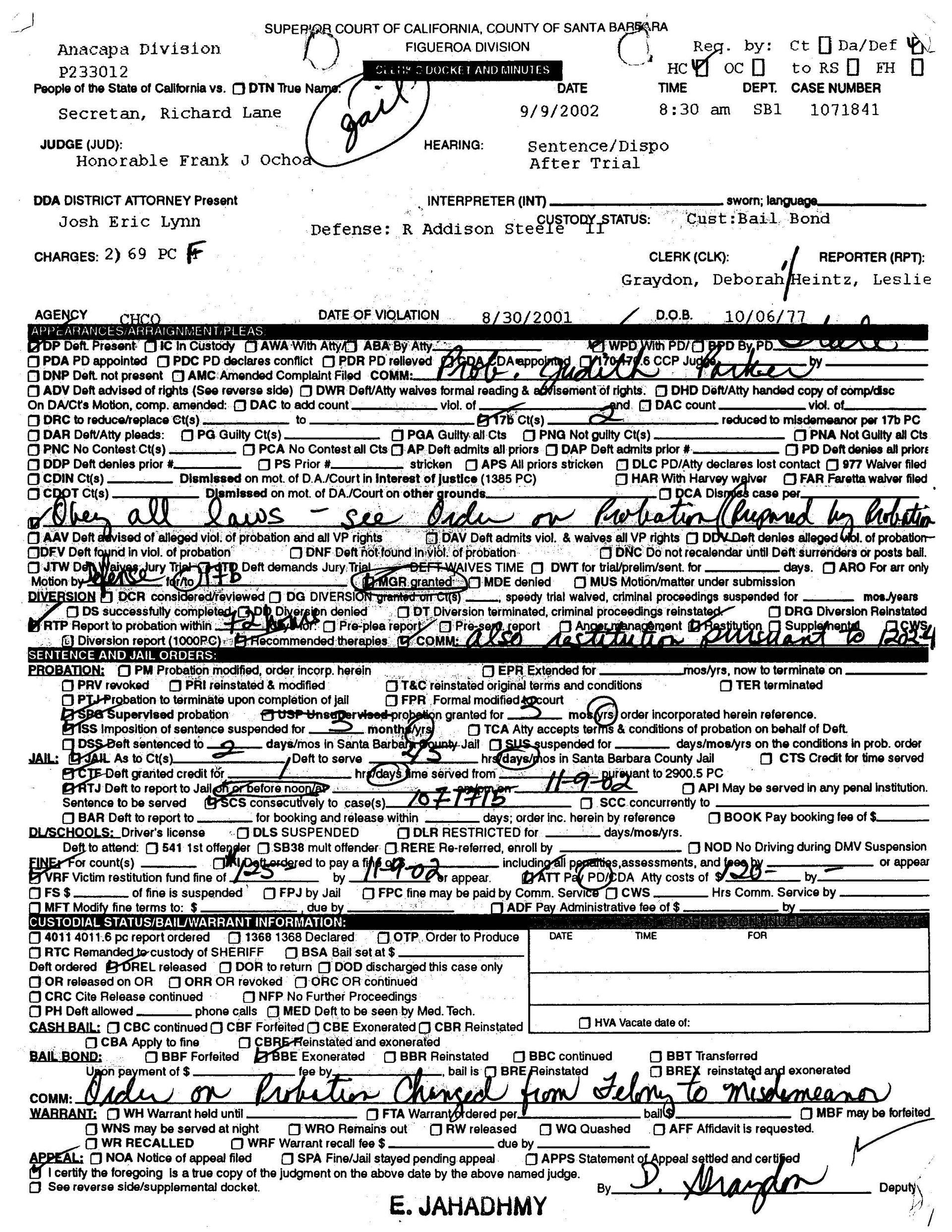
This is the Docket where Judge Frank Ochoa granted Addison's motion to reduce Richard's one convicted felony count to a misdemeanor.
Because Richard was given a misdemeanor sentence the case was a misdemeanor for all purposes.
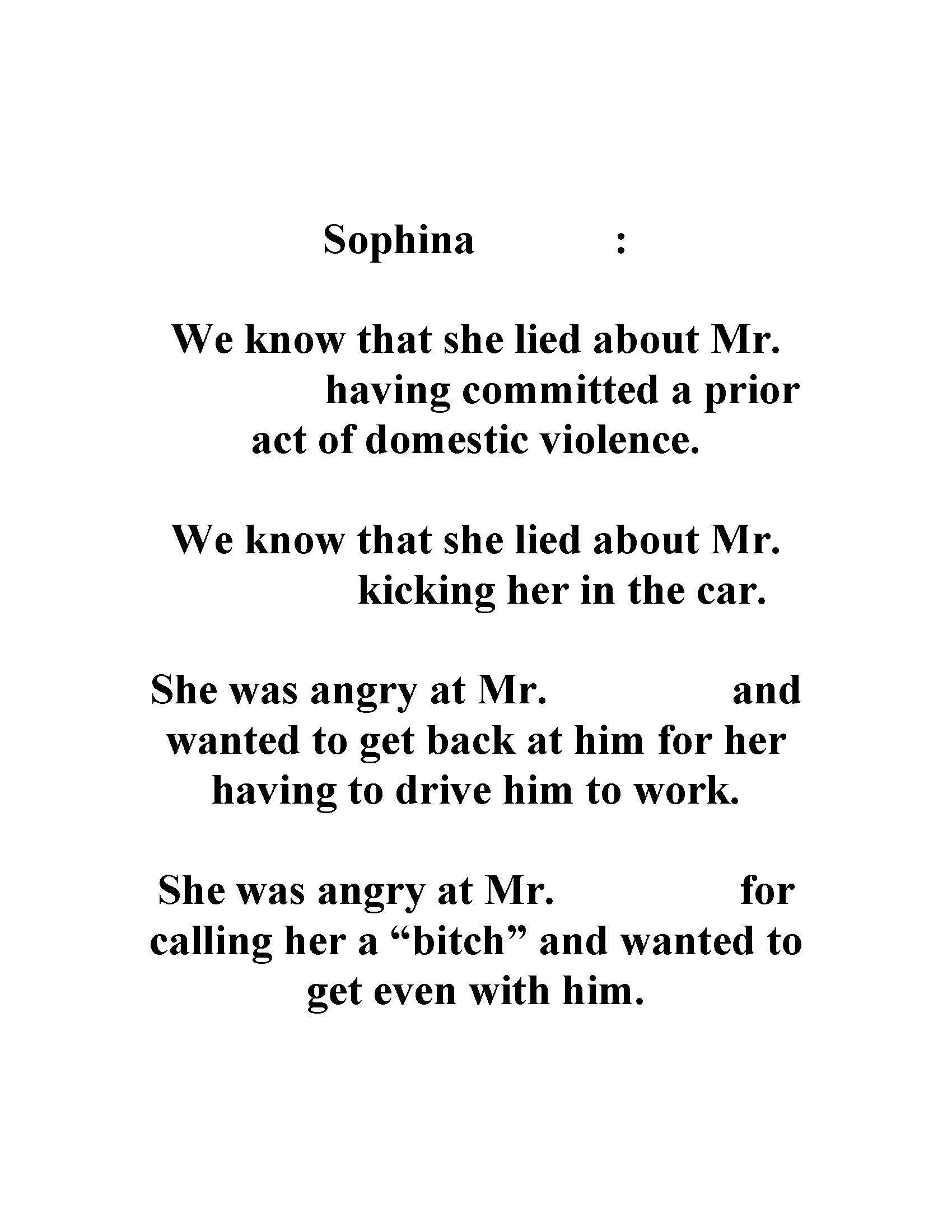
This is one of the slides that Addison used for Richard's closing (back then there was no PowerPoint,
Addison had to put it on the document camera to project onto a screen).
The jury acquitted Richard of the domestic violence charge and all lesser included offenses.
David D., RIF108018
- Charges: Assault on a police officer (Penal Code § 243(b)), resisting arrest (Penal Code § 148(a)(1)), domestic violence (Penal Code § 273.5(a)) with a lesser included offenses of domestic battery (Penal Code § 243(e)(1)) and assault (Penal Code § 241), and a vandalism charge (Penal Code § 594(b)(1)).
- Exposure: David was facing six years in prison.
- Outcome: David was acquitted both of assault on a police officer and domestic violence by the judge, the jury acquitted him of the lesser included offense of assault. He was found not guilty of domestic violence by the jury, the lesser included offense was hung ten to two in favor of acquittal and later dismissed by the judge. The lesser included offense of domestic battery (Penal Code § 243(e)(1)) had a hung jury that was hung 10-2 for not guity and then dismissed by the judge. David was convicted of vandalism and resisting arrest and sentenced to probation.
This is the Case Print that shows that shows that David was acquitted of all the domestic violence related charges.
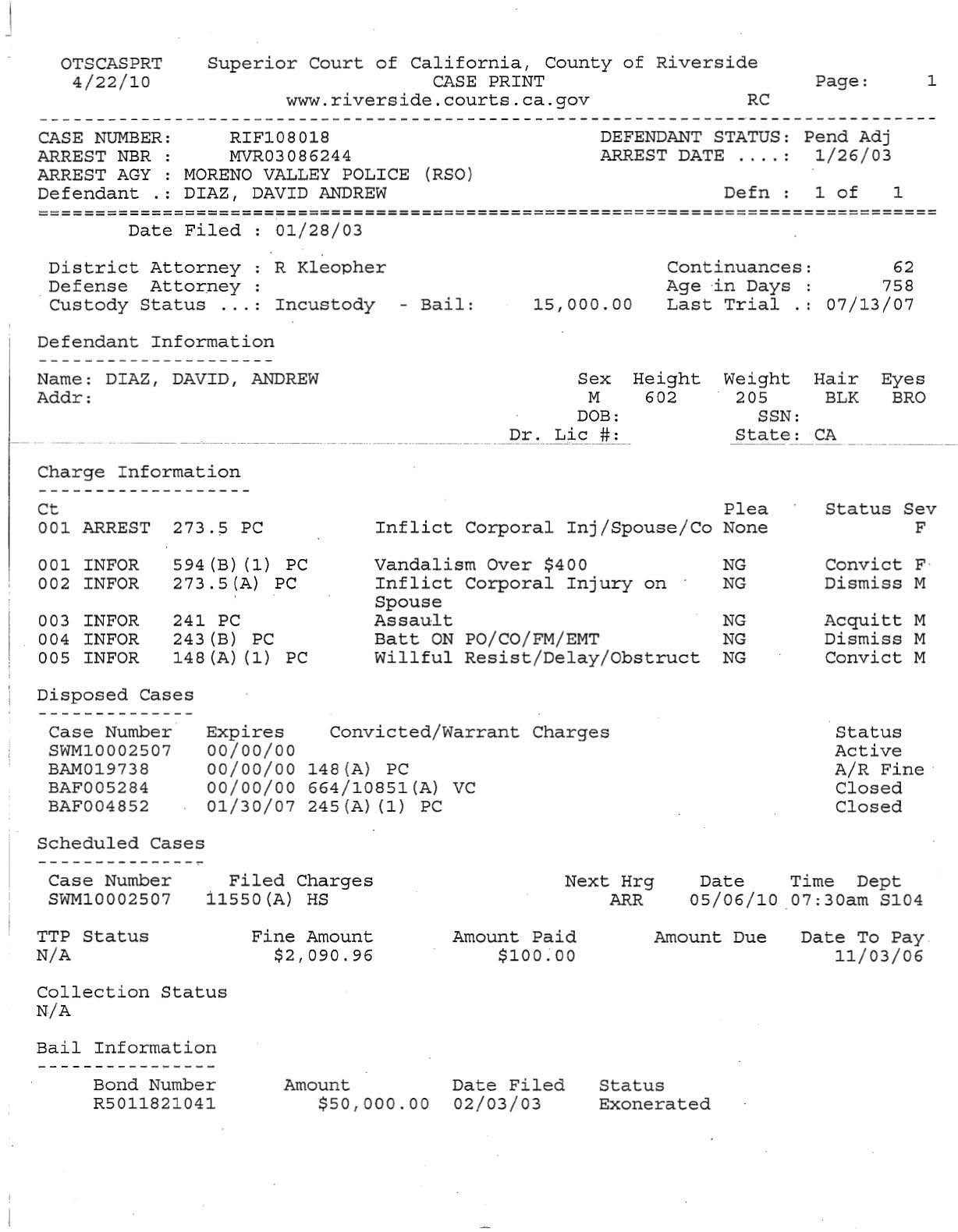
Gregory F., M984739
- Charges: Domestic violence (Penal Code § 273.5(a)), terrorist threats (Penal Code § 422), and domestic battery (Penal Code § 243(e)(1).
- Exposure: Greg was looking at a maximum two and a half years in jail.
- Outcome: Greg was found not guilty of domestic violence, but was convicted of the lesser included offense of domestic battery, he was convicted of the terrorist threats charge, he was found not guilty of the domestic battery charge, but was found guilty of the lesser included offense of simple assault. The victory on the most serious charge took a year off of his potential jail sentence. He was sentenced to probation.
Jeannette S., 18cR01797
Charges: Domestic violence (Penal Code § 273.5(a)) with a lesser included offenses of domestic battery (Penal Code § 243(e)(1)), resisting arrest with force (Penal Code § 69) and two counts of battery on police officer (Penal Code § 243(b))
Exposure: Jeanette was facing four years in jail.
Result: The jury acquitted Jeanette of all the domestic violence related charges. She was convicted of resisting arrest and battery on police officers, all of which was on video.
This is the verdict form from the most serious charge.
Jeanette was acquitted of all domestic violence related charges.

Rachel W.
Charges:
Exposure:
Result:
Lydia Z..
Charges:
Exposure:
Result:
Questions You Should Ask an Attorney That You Are Considering Hiring for a dometic violence Case:
- Have you done a domestic violence trial before?
- This question is important because a domestic violence trial involves complex issues because the rules of evidence are different in domestic violence cases. Domestic violence cases require specialized knowledge and experience and are practically a sub-specialization of criminal law.
- Addison has done sixteen domestic violence trials, eight of which were felony trials.
- What were the results of your domestic violence trials?
- This question is important because, in domestic violence trials, there are so many ways to fight hard and beat the charges. If an attorney has won domestic violence trials, that attorney has the experience and skills to handle the level of complexity involved in a domestic violence trial.
- Addison has won the domestic violence charges in five of the eight felony domestic violence trials he has done, including two trials where the client was facing a life sentence because they were three strikes trials. If you find another attorney who has done the number of domestic violence trials that Addison has done and has had more successful outcomes than he has, and who has beaten domestic violence cases where the clients were facing life sentences, hire that person. If you want the best possible chance of not going to prison and potentially going home when facing domestic violence charges, you should contact Addison.
- Do you train other lawyers in your techniques for winning domestic violence trials?
- This question is important because, typically, only the leading lawyers in a field are invited to conduct training for other lawyers.
- Addison was a speaker at the California Public Defenders Association (CPDA) homicide defense training in 2011 to train on his winning trials by humanizing the client method. He has also been given the same training at the Riverside County Public Defenders Office, the Riverside County Barristers, the Santa Clara County Public Defenders Office, and the San Francisco County Public Defenders Office. He was a speaker at the CPDA homicide defense training in 2012 to train on utilizing a neuropsychologist in a homicide case.
- How long were the domestic violence trials you've done, and how many days of defense did you present?
- These questions are important because although some cases just call for a short trial, a short trial can also mean that the prosecution was not sufficiently challenged or that no defense was presented. A felony domestic violence trial that lasts two or three court days is reason for concern because it's an indicator that the prosecution is not being thoroughly challenged and a complete defense is not being presented.
- Addison has spent 70 court days in domestic violence trials. He a success rate in domestic violence trials that is really unparalleled
If you need to talk to Addison about a domestic violence case, you can send him an email at addison@steelelawfirmsb.com or call him at (805) 995-9368.
CONTACT INFORMATION
Phone: (805) 995-9368
Email: addison@steelelawfirmsb.com
Address: 1226 1/2 State St., Suite 2, Santa Barbara, CA 93101
